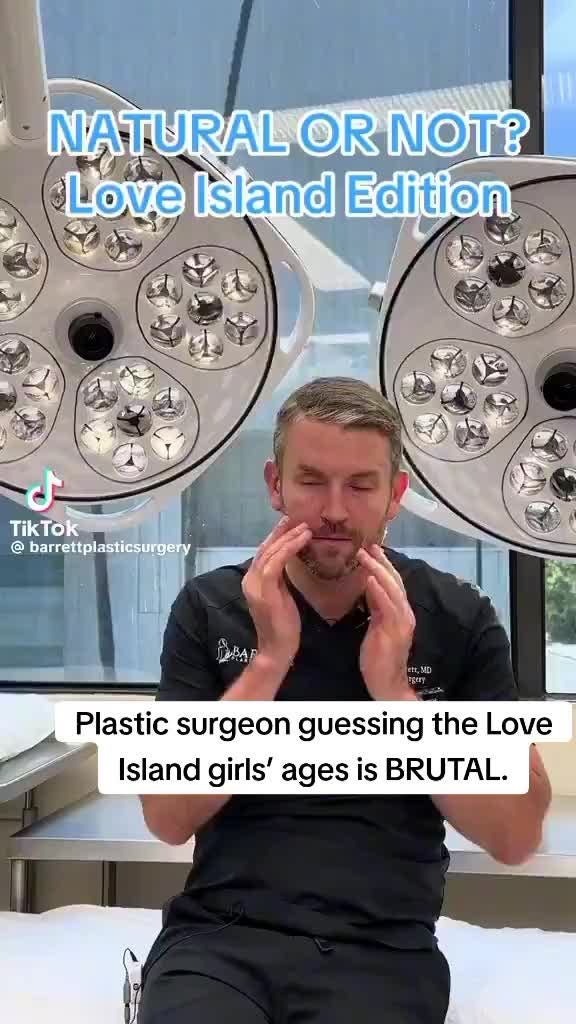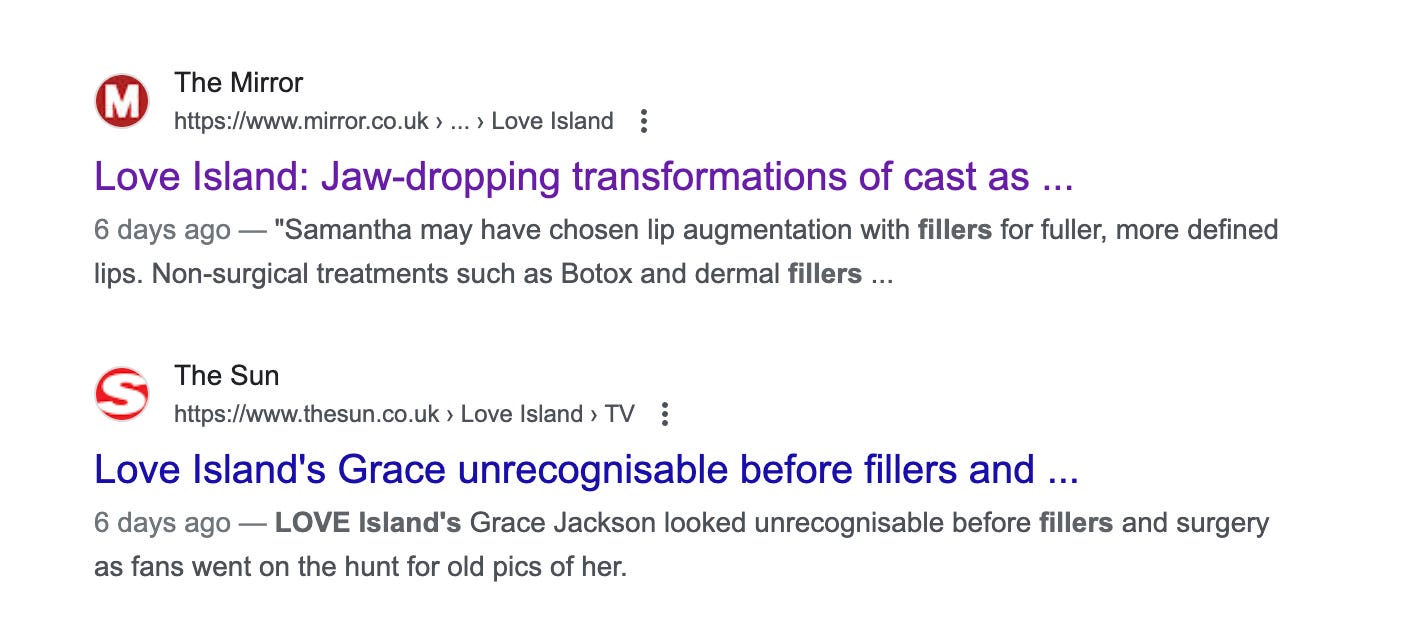Who is to blame for the Love Island Look?
As season 11 begins, so to does the brutal annual debate about female contestants appearance....
Thanks for reading The Powder Room; a safe space to discuss beauty, body culture and identity, and to cut through the noise with expert recommendations (with a dose of lols.) I write for a living, so please upgrade to a paid subscription with extra content and access; it really means a lot.
Of all the things the UK could go viral for - our inept government, our performance in the Euros, our love of queuing - it’s the ‘Love Island look’ that seems to have caught global attention.
A clip (below) of Beverly Hills cosmetic surgeon Daniel Barrett guessing the ages of the female contestants in the new season of the TV show has gone viral and incited a global discussion about the state of our beauty culture. Though the women are in their mid 20s, he guesses their ages to be much older, and says: “This is crazy! Plastic surgery and injectables done incorrectly can make you look older…”
Love Island is in its 11th season and for the uninitiated, the show brings together fame hungry contestants who are ‘looking for love’ in the guise of a sort of gameshow. That’s not how the show sells itself, obvs, but that is the truth of it. What’s become increasingly apparent as every season passes, is that there is a certain look that most of the contestants have. This isn’t a new thing either, behold season 1 cast below, this season aired back in in 2015.
So, either everyone who has ever applied looked like this (doubtful, they receive over 100,000 applications each year) or the show’s producers and casting team are actively using certain appearance markers as their criteria. A younger friend of mine - with very visible lip fillers - told me that she has been approached 3 times for the show by casting agents via her social media. It’s pretty hard to argue that Love Island - with its appalling record for diversity of every kind - isn’t actively recruiting for people who have had visible cosmetic surgery and injectables.
Why would the show do that - you ask? Maybe it’s because they know that having this look makes headlines and is a discussion point, (I am here writing about it after all!) because we also love a bit of covert classism in the UK. These ‘vain’ young women have the kind of visible cosmetic procedures that mark them out as potentially being working class and perhaps unable to afford the clinics that ‘tweak’ women in a way that’s undetectable. They might even desire this look; after all if you’re spending money on something - a new designer bag or car - and you’ve saved up for months, you want it to be seen. But either way, the British tabloids really get off on writing disparaging stories about dolled up, dressed up women who have, in their eyes, taken it too far. The undercurrent is: ‘look at these vain women doing silly things - don’t they look awful!’ Meanwhile, celebrities and the wealthy elite continue their invisible, unspoken tweaks that set these high beauty standards and trends and still so often attribute them to a new face cream, genetics or a new wellness routine.
We’re so used to seeing faces like this on our screens, that it’s easy to think that these young women who signed up for a reality tv show like Love Island should know that the intense media scrutiny on their appearance is part of the job. Despite that, I’m not sure they’d expect this sort of global outpouring and this level of judgement about their looks. But what genuinely seems to be unfathomable to the thousands commenting negatively on pictures of them is that the women actually made themselves look older by having the work done. How awful! Because who would ever want to look older when we are programmed to mourn our youthful appearance by the time we hit our late teens, and pressured into freezing time thereafter. It seems to be unthinkable that these girls don’t care about that - it blows people's minds.
The real story isn’t the spectacle of it all, it’s that at 23 they’ve been made to feel so lacking by our collective beauty culture that they’ve lost perspective on how they look, and have turned to the aesthetics industry that greets them with open arms and zero f*cks. I choose my words around aesthetic procedures carefully; I’m not against them at all, that is personal choice and something I’d consider in the future. But I’m careful not to align the industry with the medical, wellness or health sectors as so many practitioners try to. So is it any wonder that women this young are making huge changes to their bodies when cosmetic procedures that could potentially be harmful or dangerous if done incorrectly, when they are constantly framed as ‘self care’ and we’re told we deserve it. The aesthetics industry wants people’s money and it doesn’t always care how it gets it. Pick the wrong clinic or find an unethical practitioner and you might go in for some botox, and come out with filled cheeks, a chemical peel or a whole load of extra insecurities you didn’t ask for (like the time a cosmetic surgeon told me I had an unbalanced profile and needed filler in my chin without me having a moment to consent to the unsolicited critique.)
In cases like this there always seems to be a scapegoat that’s hard to pinpoint and address - and that’s purposeful. How can you level a charge at an intangible force like ‘beauty standards’, after all? Which means that nobody ever does anything about it and nobody is held to account. But it’s also because this is largely happening to women, and nobody cares that much when things hurt us. In Love Island’s case, nobody is pointing the finger at the TV show, nor is it calling for the entire aesthetics industry to be more regulated for its ethics and safety. Far easier to blame societal beauty norms, so nobody has to actually do anything about it.
So who is really to blame? There’s levels of accountability here. Those with power are the people at the top who let the aesthetics industry, beauty industries and filter-creating tech industries go unregulated, because they’re uninterested, or have vested interests, and profit from those industries in some way. A level down from them are those who run these clinics are happy to upsell people into injectables at young ages, overfill them to dangerous amounts (filler can burst, migrate and more) and don’t ofer a word of caution , dissuade or refuse to do the procedure like a reputable, ethical practitioner would. Then there are the gatekeepers; the people who write about and promote these clinics without checking their ethics and codes of conduct, or giving a balanced view of the industry - and of course, people who know that there are people willing to do anything for fame or to change their lives so will happily cast them on a TV show.
Either way - blaming ‘beauty standards’ is the ultimate cop out.
Your clinic checklist….
If you’re thinking about getting aesthetic work done, you might want to use this checklist below to ensure they’re ethically sound. These are just questions I’ve come up with as guidelines, rather than any kind of official list.
Where did you find out about the clinic? Be warned that if it's an influencer, their treatment could be free or in exchange for a post and it doesn’t mean it’s good or the clinic is right for you. Use websites like Save Face, which has a criteria to be accredited to find good quality clinics - and look at online reviews too.
Are they medically qualified and registered? You can ask to see documentation.
Do they offer free consultations? (If they pressure you to sign up on the spot that’s a red flag.)
How much do they charge? If it’s super cheap, avoid it. Botox should cost about £150-£350 and filler should start at £250 as a rough guide.
When you’re at the clinic, do they speak negatively about your appearance, or offer unsolicited opinions? Run.
Are you upsold in any way? Ie if you go in for botox - are you sold fillers too? This is not good form.
Did the clinic ask about your mental health history? They should.
Did they listen to what you said, or did they seem to have their own agenda of what they wanted to do to you?
Do any of their clients look visibly overfilled? (I know some like this look which is fine, but reputable clinics would refuse to do this.)
Are they trying to give you a generic feature - rather than refine yours? Does it have a racist undertone…ie are they saying you need a slimmer nose, or would look better with eyelid surgery?
Are they pressuring you with deals and money off? The best clinics won't do that, they just don’t need to.
Are you given aftercare advice? You should be.
Are you told about the risks, and what will happen if things go wrong, or you don’t like the result? Again, you should be given this info freely.
Upgrade your Substack to paid here.
Buy ‘UGLY: Why the word became beauty obsessed and how to break free’ in the UK here, in the US here and click here to for other countries.
Follow me on Instagram here
Find out more about my work here.











You made some fantastic point there. Smoke and mirrors! I am wondering how common these instagram faces are in real life. I have only one colleague with visible lip fillers and when I saw her the first time I had to do a doubletake because the contrast with everyone else's face was staggering. I am still unsure if in a good or bad way. Which says a lot! She would have looked perfectly fine in an IG photo at a brunch with her friends, but to see her at a desk felt out-of-place. Did this happen to anyone else?
Such a fab read. x I 100% agree, it's just too easy to blame beauty standards and it's important to hold clinics accountable too.